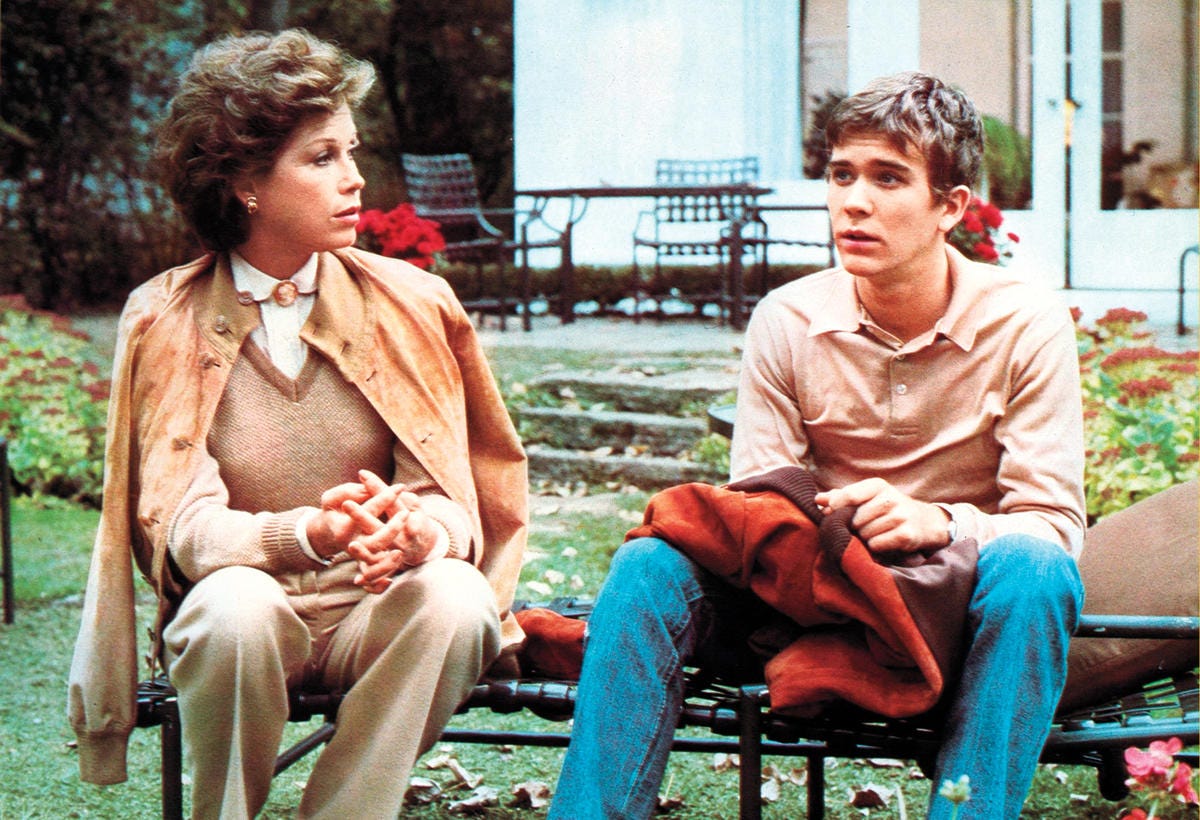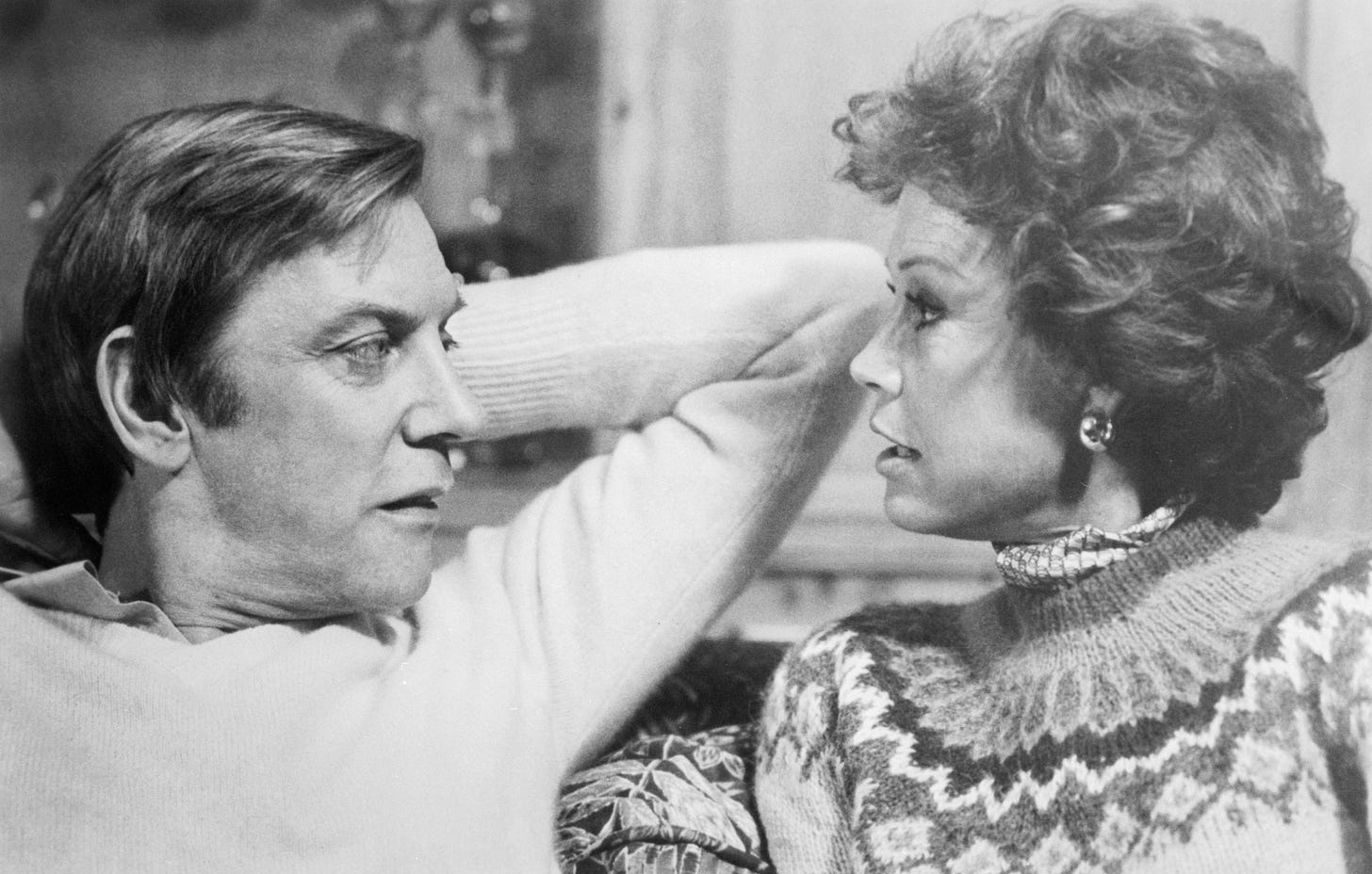The ‘80s in 40: 'Ordinary People' (September 19, 1980)
Robert Redford's directorial debut assessed the state of masculinity at the turn of the decade while casting a sympathetic eye at a family in crisis.
If you live in Chicago—in Chicago proper, not the greater Chicagoland area—the suburbs can seem like a foreign country. That’s especially true of the towns and villages that make up North Shore, which look like a high-end catalog version of an American suburb. If you take Clark Street north past Howard you’ll hit Evanston, a city that has its own downtown and, of course, a Big Ten college, but which feels a bit like an extension built onto Chicago to deal with overflow, a kind of SRO section for the north side. But if you keep driving, Evanston starts to warp and grow unfamiliar. The houses expand. The lawns get bigger. Driveways arc up to front doors with pillars. The streets are crowded with Teslas and the sidewalks with tennis whites. Turn off on the wide side roads and you’ll see the movie homes of Kevin McCallister, Joel Goodsen, and Sam Baker. These houses look perfect, like trouble could never cross their doorsteps.
The Reveal is a reader-supported newsletter dedicated to bringing you great essays, reviews and conversation about movies (and a little TV). While both free and paid subscriptions are available, please consider a paid subscription to support our long-term sustainability.
That makes them easy targets for satire and subversion, and ’80s movies abound with examples of both, particularly as the decade grew deeper and the suburban ideal became synonymous with Ronald Reagan’s promise of a new morning in America. The movies reminded us that behind some of those doors were fretful teens turned pimps. Sometimes severed ears turned up in the green grass.
But all of that was still to come when Robert Redford’s Ordinary People arrived in theaters six weeks before Reagan’s election, heralded by a marketing campaign with the tagline “It Hits Home.” In fact, the possibility that her bestselling 1976 novel could be given a satirical bent made author Judith Guest a bit hesitant to sell the film rights. Guest published the book, her first, at 40, blindly submitting it to New York publishers without the help of an agent and then selling it for a modest advance to Viking, the first such submission the publisher had accepted in nearly three decades.
Guest was writing what she knew, or at least where she knew. A mother of three and wife to the vice president of a microfilm company, she lived in an upscale Minneapolis suburb, arriving there via a Detroit suburb by way of Arlington Heights, a Tony Chicagoland community where she contributed to the local paper. Guest offered a peek behind the doors of one of those seemingly perfect homes not as an act of exposure but out of sympathy.
The title Ordinary People changes depending on the angle from which you look at it. For one it’s a bit insulting to much of America, if not the world, that the upscale WASPs at the center of the story would be the definition of ordinary. These are the normals? My own background fits every letter of the WASP acronym, and even to me the level of privilege on display by denizens of the uppermost level of the upper middle class (and beyond) in the North Shore looks bizarre. From another angle, it’s a deeply humanistic title. It’s not that its WASPs deserve any extra sympathy. It’s that they can be hurt and broken just as easily as anyone else.
Decades can be porous, culturally speaking, and Ordinary People often plays like one of the last products of the 1970s, a decade in which the “sensitive male,” if never quite idealized, had more of a foothold in the culture than it would a few years later, in the face of a backlash evidenced by books like Real Men Don’t Eat Quiche and articles about “wimpophobia.”. But Redford’s film reminds us that even the ’70s were filled with those protecting the border of what real men did and did not do.
Real men don’t, for instance, end up in institutions after attempting suicide. No one says this directly to teenager Conrad Jarrett (Timothy Hutton), but after he returns home, it’s the subtext of most interactions with the friends from whom he feels increasingly alienated. And real men definitely don’t let themselves be subjected to electroshock therapy, as Conrad’s macho swimming coach (M. Emmet Walsh) tells him point blank. Or at least he wouldn’t, and he’s inarguably a real man.
Ordinary People is squarely a drama but it sometimes plays like a ghost story. Conrad, his mother Beth (Mary Tyler Moore) and father Calvin (Donald Sutherland) live with the specter of Buck (Scott Doebler), the family’s eldest son, whose death in a boating accident has come to define their existence. Not that they talk about it, at least not very much, to others or amongst themselves. But it’s always there. In flashes, Conrad remembers the accident but also the times before Buck’s death, when Beth would laugh and her smile wouldn’t look like a mere simulation of joy.
Do real men see therapists? Conrad does and so, in time, does his father. They both end up patients of Dr. Berger (Judd Hirsch), a cardigan-wearing and Jewish—they assume, though also allow he might just be German—psychiatrist who operates from a cluttered office above a shop in Highland Park. Whatever Berger’s ethnicity, he’s an outsider to their world and their way of doing things, a blunt man who talks directly about feelings and isn’t afraid to raise his voice.
It’s unclear what kind of treatment, beyond electroshock, Conrad received in the hospital, but he’s clearly never been challenged like he’s challenged by Berger. His new doctor’s approach forces him to think about his past, the role it plays in his life now, and its effect on others, especially Beth who, if she doesn’t blame Conrad for Buck’s death, at least resents him for surviving. In one scene she goes from flashing a loving grin for family photos to being unable to fake it long enough to take a family photo with her remaining son. Buck’s death has changed her.
Or maybe it’s just brought out the worst of whatever was already there. “Can’t you see anything except in terms of how it affects you?,” her husband asks at the beginning of an ugly argument. “No,” she replies, “I can’t. And neither can you and neither can anybody else, only maybe I’m just a little more honest about it.” A true narcissist can’t imagine anyone else being anything less than true narcissists themselves.
It would be tempting to see Beth as the villain of the piece—the real monster in the Jarretts’ haunted house—if Moore didn’t embody her with three full dimensions. That Moore doesn’t break radically from the upbeat persona so familiar from her decades of sitcom work makes it all the more effective. This isn’t a star trying to put miles of distance between herself and her past. It’s Moore showing how the same winning qualities that made her America’s sweetheart could double as a mask.
It’s a transitional film in other ways, too (even if Moore would struggle to get a chance to work this well at this level again). For director Redford, it was a chance to establish himself as more than just one of the most respected and successful movie stars of his generation—a champagne problem, to be sure, but a problem nonetheless. It’s in many ways, Ordinary People is the sort of film you’d expect an actor to direct, one that makes room for the cast to dig deeply into the nuances of the script, in this case by Alvin Sargent. But it’s also the work of a filmmaker with a gift for composition—witness the way Conrad goes out of focus behind Beth when she answers the phone with a chipper greeting—and understatement. The past, especially Conrad’s memories of the boating accident, intrudes via unwelcome shocks at inopportune moments, mimicking the experience of unwanted memories.
Ordinary People won four Oscars—Best Picture, Best Director, Best Adapated Screenplay, and Best Supporting Actor (for Hutton)—the following spring. By virtue of competing with Raging Bull it will forever, and unfairly, be remembered as a spoiler akin to How Green Was My Valley, which beat out Citizen Kane for Best Picture. That Raging Bull director Martin Scorsese would be bested by another actor making his directorial debut a decade later when Kevin Costner’s Dances with Wolves beat out Goodfellas probably hasn’t helped Redford’s film’s reputation in some circles, either. But here’s the thing: both How Green Was My Valley and Ordinary People are excellent, and their Oscars success isn’t their fault.
If anything, it’s a wonder that a film so tightly focused and so intimate could enjoy such success, and fortuitous it arrived ahead of a spreading cultural repulsion of wimps. That’s true particularly of one that ends like Ordinary People: with a father and son sharing a moment together after confronting the tragedy they’ve tried not to talk about. Looking out on the wintry lawn, they consider the toll exacted from their family, alone together with no one around to question if this is what real men do.
Next: 9 to 5







I am hopping into the comments because I genuinely love this movie!!! It’s in my top 10 of favorite films. Mary Tyler Moore and Donald Sutherland are doing some of their finest work in this! Anyway not to get too deep but, I happened to see Ordinary People many years ago when I was dealing with the aftermath of the very sudden death of a good friend and it knocked me back how relatable it was and also kind of was a very therapeutic viewing experience. I’ll still stop to watch the rest of it if I catch it randomly on TV, it’s just one of those movies for me now. Great piece Keith!
I think this is a better film than Raging Bull. I might have given Scorsese director, but picture belongs here